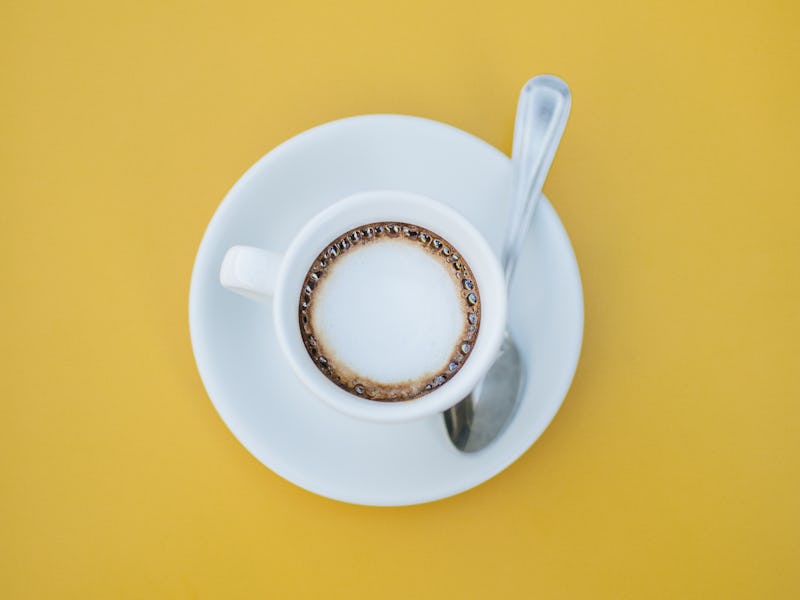Algorithm That Calculates Your Ideal Caffeine Intake Will Go Public in 2019
Personalized caffeine dosing may soon be in civilian hands.

Caffeine has been popular for centuries, but US Army researchers think we’re only beginning to scratch the surface of how to get the most from this stimulant. With the right personalized schedule, it’s possible to ensure that each drop of caffeine is used to maximize alertness and performance. And better yet, this tool may be in civilian hands next year, its developers tell Inverse.
The app, called 2B-Alert, is still in development at Montana State University’s Tech Link Center in collaboration with Jaques Reifman, Ph.D., of the US Army’s Medical Research and Materiel Command.
Reportedly, the app has a series of algorithms that help determine the closest thing we currently have to a personalized schedule for caffeine dosing.
In June, the team published a paper in the Journal of Sleep Research suggesting that the algorithms — not yet available to the public — can learn how an individual responds to caffeine through a series of reaction time tests, and use that information to determine the perfect times they take a coffee break.
The app seems to provide "group" and individualized caffeine dosing suggestions
Quentin King, Ph.D., the senior technology manager at TechLink, says the app has generated a lot of buzz since it was announced.
“We’ve seen a tremendous response since the summer; both from companies who recognize the commercial opportunity in partnering with the Army to bring 2B-Alert to market, and from individuals who are asking where they can download the app,” he tells Inverse.
“I can’t provide a guaranteed delivery date; however we are anticipating a time scale of approximately two to six months.”
The Army has been researching caffeine’s effects on soldiers for a while, but King is looking to bring this app to civilians: He points specifically to college students studying for exams, or elite athletes looking to improve performance. But the question remains as to whether this app can actually predict how an individual processes caffeine to get the most out of their dose. If the app can take that into account, then King and his team have got a powerful tool on their hands.
Why Individual Caffeine Dosing Is so Hard: Genetic Factors
Figuring out how to maximize the power of caffeine for performance is already the subject of ongoing research at Massey University’s School of Exercise, Sport, and Science in New Zealand (not affiliated with this app), where they’ve been researching how elite athletes can use caffeine to improve performance. Kyle Southward, a research assistant who released a paper in the journal Nutrients in September, tells Inverse that his work has narrowed down some specific genetic markers that may hold the key.
“We know some genes affect responses to caffeine ingestion,” he says. “We would like to make more specific guidelines to optimize the ergogenic” — performance-enhancing — “effects from caffeine supplementation.”
The Army has been investigating the effects of caffeine on soldiers for years and is now turning to more personalized dosing approaches
Right now, there appear to be two genes that primarily affect how someone might process caffeine: CYP1A2 and ADORA2A.
In terms of caffeine dosing, Southward says CYP1A2 would likely affect when someone should start drinking coffee before an event because it affects how fast caffeine is broken down in the body. People with one certain variation of this gene are “fast metabolizers,” meaning that their bodies process caffeine quickly.
Strangely, this isn’t always related to an enhanced boost. In fact, Southward thinks that individuals with this genotype might need to take caffeine closer to their event (sports, exams, or otherwise) of choice because caffeine remains active for a shorter time in their bodies compared to the “slow metabolizers.”
ADORA2A, on the other hand, affects how hard the caffeine high might hit. This gene encodes adenosine sensors in the brain, to which caffeine binds to induce its effects. Southward explains that this gene likely affects how sensitive some people are to caffeine — whether they just feel energized or tend to feel jittery and anxious. Though they’re not sure exactly how this works, the idea is that some individuals might simply need less caffeine to achieve the same boost as others.
“Our hypothesis is that some individuals with one variation of the ADORA2A gene may not need as much caffeine compared to the other variations,” he adds. “They would receive equivocal ergogenic effects with a smaller amount of caffeine compared to a less sensitive individual.”
These genetic differences are just a few of the multitude of factors that impact when someone should consume caffeine and how much they should take. In short, an app that provides individualized caffeine dosing schedules has a lot of confounding factors.
How The App Creates Personalized Caffeine Recommendations
The only way to truly know if you’re a fast or slow metabolizer would be to undergo genetic testing, but this app seems like it’s just going to create an approximation. On its website, the team offers that the algorithm “learns an individual user’s specific phenotypical responses to sleep loss and caffeine consumption,” so to that end it seems like they’re taking personalized responses to caffeine into account. Inverse has reached out to the Army’s Medical Research and Materiel Command regarding this claim and will update this article with their response.
A personalized mobile app is a pretty big step forward for 2B-Alert, which first launched an online tool to predict the effects of caffeine and sleep on alertness in 2016. This tool took into account an “average user,” but the fully functional version — currently only available to the military — appears to go beyond these generalities.
But in terms of caffeine dosing, it seems like that one-size-fits-all model is disappearing. We’ve been using caffeine for centuries, but only now are we figuring out how to optimize it.
You Might Also Like: A Neuroscientist Reveals the Connection Between Caffeine and Anxiety